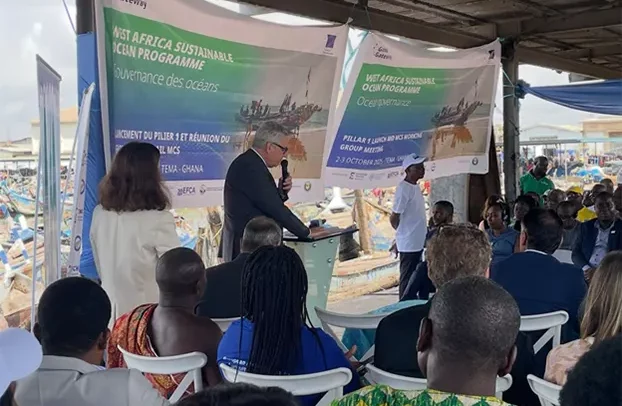Rune Skinnebach addressing the gathering
The European Union (EU), in partnership with Ministry of Fisheries and Aquaculture and the Secretariat of the Fisheries Committee for the West Central Gulf of Guinea (FCWC), has inaugurated the €59 million West African Sustainable Ocean Programme (WASOP).
The EU Ambassador to Ghana, Rune Skinnebach, said the initiative represents a major collaborative effort to tackle pressing challenges in the maritime sector, particularly the issue of Illegal, Unreported and Unregulated (IUU) fishing, which threatens marine biodiversity, undermines the livelihoods of legitimate fishers, and inflicts severe economic losses on coastal nations.
He said this at a ceremony held at the Artisanal Fishing Basin in the Tema Fishing Harbour, where stakeholders and local fishers to affirm a shared commitment to combat IUU fishing and strengthen sustainable ocean governance.
Mr. Skinnebach described the initiative as a cornerstone of international partnership.
“This is one of my first public engagements, so it feels wonderfully symbolic. It tells you where my priorities lie, and those of the European Union: in partnership, in sustainability, and in our shared future,” he stated.
Drawing on his Danish heritage, Ambassador Skinnebach highlighted the universal significance of the ocean, saying, “The ocean is our common heritage, and its health is our shared responsibility.”
He stressed that oceans provide invaluable resources that affect every aspect of life, yet remain under constant threat.
According to him, WASOP reinforces the EU’s joint commitment with Ghana to safeguard and grow the marine economy, while the substantial funding will support a comprehensive regional strategy focusing on advanced Monitoring, Control, and Surveillance (MCS) systems to secure marine resources for future generations.
The Minister of Fisheries, Emelia Arthur, emphasised that the “success of WASOP relies on our capacity to work in unison—across borders, sectors, and communities – ensuring that our oceans are not only protected for today’s challenges, but preserved for future generations.”
She further explained the symbolic choice of the Tema Fishing Harbour for the inauguration, noting, “We chose this venue so that everyone will understand that fisheries is life, fisheries is culture, fisheries is livelihood, fisheries is an ecosystem.”
By Belinda Adjei


